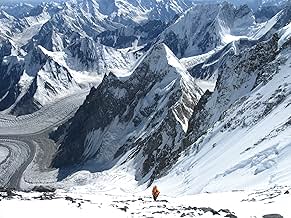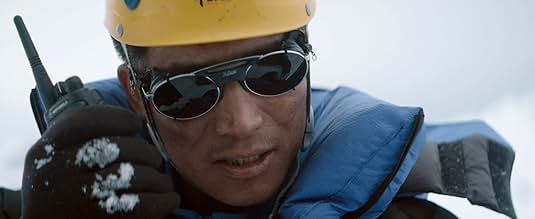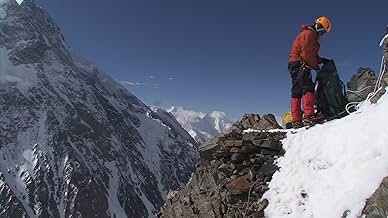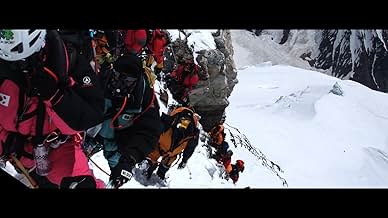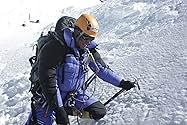PUNTUACIÓN EN IMDb
6,8/10
5,6 mil
TU PUNTUACIÓN
Añade un argumento en tu idiomaThe story of the deadliest day on the world's most dangerous mountain, when 11 climbers mysteriously perished on K2.The story of the deadliest day on the world's most dangerous mountain, when 11 climbers mysteriously perished on K2.The story of the deadliest day on the world's most dangerous mountain, when 11 climbers mysteriously perished on K2.
- Premios
- 3 premios y 5 nominaciones en total
Walter Bonatti
- Self
- (metraje de archivo)
Gerard McDonnell
- Self - Climber
- (metraje de archivo)
Hristo Mitzkov
- Marco Confortola
- (as Christo Mitzkov)
Lochlann O'Mearáin
- Ger McDonnell
- (as Lochlainn O'Mearain)
Reseñas destacadas
High-altitude mountaineering fascinates many people, this reviewer included, for the extreme demands it places on sportsmen engaged on the sport. They go to places where helicopters don't go, where no human could live for extended periods of time. Different than other extreme nature sports like rafting, cross-country skiing or long-distance trekking, mountaineering provides the only way for people to reach places that are higher above the rest of the World.
In this context, I generally like documentaries and docudramas that focus on various aspects of the sport, its challenges and also its tragedies.
However, The Summit covers a nice story on a confusing and haphazard edition. It combines real-time footage of events, 'debriefing'-style post-fact interviews and dramatization of events are accounted by those that survived or witnessed them first-hand. All that material should yield a great final piece, but I'm left with the feeling of watching an unfinished job, or a piece that was somehow the result of compromises of an intractable committee with diverging opinions on how the documentary should look like.
In this context, I generally like documentaries and docudramas that focus on various aspects of the sport, its challenges and also its tragedies.
However, The Summit covers a nice story on a confusing and haphazard edition. It combines real-time footage of events, 'debriefing'-style post-fact interviews and dramatization of events are accounted by those that survived or witnessed them first-hand. All that material should yield a great final piece, but I'm left with the feeling of watching an unfinished job, or a piece that was somehow the result of compromises of an intractable committee with diverging opinions on how the documentary should look like.
"He discovers things about his own body and mind that he had almost forgotten in the day-to-day, year-to-year routine of living." James Ramsey Ullman, High Conquest.
I don't know about you, but if I were approaching the "death zone" while mountain climbing, I'd turn back. However, you can bet the heroes of the documentary, The Summit, hiking the world's second biggest and most difficult mountain (it defeats 1 out of every 4 climbers), K2, had no such thoughts. The Summit won the Sundance World Cinema documentary award this year.
More interesting than the physical exploits is the rationale for doing such a dangerous sport in the first place. Yet, such psychoanalyzing is not a matter for The Summit, a thrilling doc long on the difficult climb and more difficult decisions while fates are decided in sometimes inscrutable and random ways. It's short on the motivation, which pretty much is accepted these days as, "because it's there."
Eleven climbers of 25 lost their lives that day in 2008 without an adequate explanation for any of the deaths. However this thesis is proved once more: Most lives in climbing are lost on the descent. The film has a fragmented, multiple-points-of-view (think of a climbing Rashomon) approach that cuts among the several players and history while featuring a couple of the more charismatic climbers, especially Ger McDonnell, whose death is the most difficult to understand even as he's touted for his alleged attempt to save 3 Korean climbers.
This discursive storytelling can be confusing while it saps the thrust of the inherently intriguing story. The many re-enactments drain the film of its immediate "what-the" doc impact. The film retains some of the awe we all feel when in the presence of such a manifestation of Nature's power:
"You do not laugh when you look at the mountains, or when you look at the sea." Lafcadio Hearn
I don't know about you, but if I were approaching the "death zone" while mountain climbing, I'd turn back. However, you can bet the heroes of the documentary, The Summit, hiking the world's second biggest and most difficult mountain (it defeats 1 out of every 4 climbers), K2, had no such thoughts. The Summit won the Sundance World Cinema documentary award this year.
More interesting than the physical exploits is the rationale for doing such a dangerous sport in the first place. Yet, such psychoanalyzing is not a matter for The Summit, a thrilling doc long on the difficult climb and more difficult decisions while fates are decided in sometimes inscrutable and random ways. It's short on the motivation, which pretty much is accepted these days as, "because it's there."
Eleven climbers of 25 lost their lives that day in 2008 without an adequate explanation for any of the deaths. However this thesis is proved once more: Most lives in climbing are lost on the descent. The film has a fragmented, multiple-points-of-view (think of a climbing Rashomon) approach that cuts among the several players and history while featuring a couple of the more charismatic climbers, especially Ger McDonnell, whose death is the most difficult to understand even as he's touted for his alleged attempt to save 3 Korean climbers.
This discursive storytelling can be confusing while it saps the thrust of the inherently intriguing story. The many re-enactments drain the film of its immediate "what-the" doc impact. The film retains some of the awe we all feel when in the presence of such a manifestation of Nature's power:
"You do not laugh when you look at the mountains, or when you look at the sea." Lafcadio Hearn
Confusing and untrue at times. I had to read about what actually happened to find out the facts after 2 hours of poorly put together interviews. Also the Serbian climber was quite selfless and died because he unclipped to let other people pass him, not to pass Skog. I don't know why they would make such a strange mistake on this detail, but it's either deliberate lying to make the story better or poor research.
At 8 a.m. climbers were finally advancing through the Bottleneck. Dren Mandić, from the Serbian team, decided to attend to his oxygen system and so unclipped from the rope to let other climbers pass. Mandić lost his balance and fell, bumping into Cecilie Skog of the Norwegian team. She was still clipped to the rope and was only knocked over. Mandić fell over 100 m down the bottleneck.
At 8 a.m. climbers were finally advancing through the Bottleneck. Dren Mandić, from the Serbian team, decided to attend to his oxygen system and so unclipped from the rope to let other climbers pass. Mandić lost his balance and fell, bumping into Cecilie Skog of the Norwegian team. She was still clipped to the rope and was only knocked over. Mandić fell over 100 m down the bottleneck.
On August 2008, 11 mountain climbers die on top of the world second highest peak K2. This is a mix of interviews, documentary and recreations to tell the story of the eclectic mix of international teams of climbers. Also it has interviews with Walter Bonatti who is the youngest member of the '54 Italian expedition to summit K2 for the first time.
This is such a compelling true story. The climb and the descend is very tense. The only problem comes with a confused recounting of any controversy in the last 15 minutes. The ending is about a search for what happened to Ger McDonnell. It seems necessary to concentrate much more on him for the whole movie. Since they're doing recreations anyways, it's probably best to just do a narrative story with Ger as the protagonist.
This is such a compelling true story. The climb and the descend is very tense. The only problem comes with a confused recounting of any controversy in the last 15 minutes. The ending is about a search for what happened to Ger McDonnell. It seems necessary to concentrate much more on him for the whole movie. Since they're doing recreations anyways, it's probably best to just do a narrative story with Ger as the protagonist.
I'd like to add to the chorus of voices complaining about The Summit, a collection of poignant interviews, skillfully staged re-creations of actual events, and documentary photographs and film footage, all jumbled together into an almost incomprehensible mess. It's not as if this documentary about the tragic events on K2 in the summer of 2008 is poorly edited, it's more like it wasn't edited at all. Imagine watching a story that has been chopped into pieces, thrown into a blender, and then reassembled by someone suffering from the same hypoxic delirium that contributed to the deaths of some of the climbers. One is left with the feeling of having watched an interesting and compelling story that should have been told in a far more concise and straightforward manner. Unfortunate, too, because it's a heck of a story.
¿Sabías que...?
- CuriosidadesWon Best Feature film at 2013 BANFF film festival. The award was accepted on behalf of the film makers by Norwegian adventurer Cecilie Skog, who is featured in the film.
- Créditos adicionalesThe title of the movie does not show until about 15 minutes into the film.
- ConexionesReferenced in Film Junk Podcast: Episode 457: Nymphomaniac Vol. 1 and True Detective (2014)
Selecciones populares
Inicia sesión para calificar y añadir a tu lista para recibir recomendaciones personalizadas
- How long is The Summit?Con tecnología de Alexa
Detalles
- Fecha de lanzamiento
- Países de origen
- Sitios oficiales
- Idiomas
- Títulos en diferentes países
- Döden på K2
- Localizaciones del rodaje
- K2, Karakoram Mountain Range, Pakistan(Aerial Sequences)
- Empresas productoras
- Ver más compañías en los créditos en IMDbPro
Taquilla
- Presupuesto
- 1.000.000 US$ (estimación)
- Recaudación en Estados Unidos y Canadá
- 243.550 US$
- Fin de semana de estreno en EE. UU. y Canadá
- 20.904 US$
- 6 oct 2013
- Recaudación en todo el mundo
- 277.651 US$
- Duración
- 1h 35min(95 min)
- Color
- Relación de aspecto
- 1.85 : 1
Contribuir a esta página
Sugerir un cambio o añadir el contenido que falta


